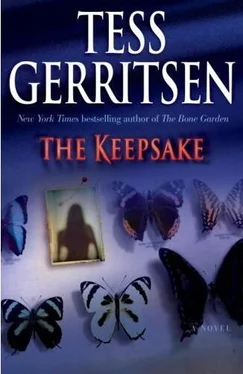Josephine Pulcillo was a fraud.
She and Frost were silent as they walked into the hospital, as they rode the elevator to the surgical wing. Never before had she felt such a gulf between them. Though they were side by side, there was now a continent separating them, and she didn’t even glance at him as they headed up the hall. Grimly, Jane pushed open the door to room 216 and stepped inside.
The young woman they’d known as Josephine stared at them from the bed. In her flimsy hospital gown, she looked fetchingly vulnerable, a doe-eyed maiden in need of rescue. How the hell did she do it? Even with her unwashed hair and her leg in a clunky cast, she managed to look beautiful.
Jane didn’t waste time. She crossed straight to the bed and said, “Do you want to tell us about San Diego?”
At once, Josephine’s gaze dropped to the sheets, avoiding Jane’s. “I don’t know what you’re talking about.”
“You would’ve been about fourteen years old then. Old enough to remember what took place that night.”
Josephine shook her head. “You must have me mistaken for someone else.”
“Your name was Susan Cook at the time. You were a student at William Howard Taft Middle School and you lived with your mother, who called herself Lydia Newhouse. One morning, you both packed up and abruptly left town. That was the last time anyone heard of Susan and her mother.”
“And I suppose that’s illegal, to suddenly leave town?” Josephine retorted, her gaze at last snapping up to meet Jane’s in an act of sheer nerve.
“No. That isn’t.”
“So why are you asking me about it?”
“Because it’s very illegal to shoot a man in the back of the head.”
Josephine’s expression went as smooth as glass. “What man?” she said calmly.
“The man who died in your bedroom.”
“I don’t know what you’re talking about.”
The two women stared at each other for a moment. And Jane thought: Maybe Frost can’t see through you, but I sure as hell can.
“Have you ever heard of a chemical called luminol?” Jane asked.
Josephine shrugged. “Should I have?”
“It reacts with the iron in old blood. When you spray it on a surface, any blood residue lights up in the dark like neon. No matter how hard you clean up after someone bleeds, you can’t wash away all the traces. Even after you and your mother wiped down the walls, mopped the floors, the blood was still there, hiding in the cracks. In the baseboards.”
This time Josephine stayed silent.
“When the San Diego police searched your old house, they sprayed luminol. One bedroom lit up like crazy. It was your bedroom. So don’t tell me you know nothing about it. You must have been there. You know exactly what happened.”
Josephine had paled. “I was fourteen,” she said softly. “That was a long time ago.”
“There’s no statute of limitations for murder.”
“ Murder?Is that what you think it was?”
“What happened that night?”
“It wasn’t murder.”
“Then what was it?”
“It was self-defense!”
Jane nodded in satisfaction. They’d made progress. At last she’d admitted that a man had died in her bedroom. “How did it happen?” she asked.
Josephine glanced at Detective Frost, as though seeking his support. He had been standing near the door, his expression cool and unreadable, and clearly she could expect no favors from him, no sympathy.
“It’s time to come clean,” said Jane. “Do it for Gemma Hamerton. She deserves justice, don’t you think? I’m assuming she was a friend?”
At the mention of Gemma’s name, Josephine’s eyes glazed over with tears. “Yes,” she whispered. “More than a friend.”
“You do know she’s dead?”
“Detective Abbott told me. But I already knew,” Josephine whispered. “I saw her lying on the floor…”
“I’m guessing these two events are connected. Ms. Hamerton’s death, and that shooting in San Diego. If you want justice for your friend, you’ll answer my questions, Josephine. Or maybe you’d rather be called Susan Cook? Since that was the name you went by in San Diego.”
“My name is Josephine now.” She gave a weary sigh, all pretenses gone. “It’s the name I’ve had the longest. The one I’m used to now.”
“How many names have there been?”
“Four. No, five.” She shook her head. “I don’t even remember anymore. There was a new one every time we moved. I thought Josephine would be the last.”
“What’s your real name?”
“Does it matter?”
“Yes, it does. What name were you born with? You might as well tell us the truth, because I promise you, we’ll find out eventually.”
Josephine’s head drooped in surrender. “My last name was Sommer,” she said softly.
“And your first name?”
“Nefertari.”
“That’s an unusual name.”
Josephine gave a tired laugh. “My mother never made conventional choices.”
“Wasn’t that the name of some Egyptian queen?”
“Yes. The wife of Ramses the Great. Nefertari, for whom the sun doth shine. ”
“What?”
“It’s something my mother used to say to me. She loved Egypt. All she talked about was going back.”
“And where is your mother now?”
“She’s dead,” Josephine said softly. “It was three years ago, in Mexico. She was hit by a car. When it happened, I was in graduate school in California, so I can’t tell you much more than that…”
Jane pulled over a chair and sat down by the bed. “But you can tell us about San Diego. What happened that night?”
Josephine sat with shoulders slumped. They had her cornered, and she knew it. “It was summertime,” she said. “A warm night. My mother always insisted we close the windows, but that night I left mine open. That’s how he broke into the house.”
“Through your bedroom window?”
“My mother heard a noise, and she came into my room. He attacked her, and she defended herself. She defended me. ” She looked at Jane. “She had no choice.”
“Did you see it happen?”
“I was asleep. The gunshot woke me.”
“Do you remember where your mother was standing when it happened?”
“I didn’t see it. I told you, I was asleep.”
“Then how do you know it was self-defense?”
“He was in our house, in my room. That makes it justified, doesn’t it? When someone breaks into your house, don’t you have a right to shoot him?”
“In the back of the head?”
“He turned! He knocked her down and turned. And she shot him.”
“I thought you didn’t see it.”
“That’s what she told me.”
Jane leaned back in her chair but her gaze remained fixed on the young woman. She let the minutes pass, let the silence have its effect. A silence that emphasized the fact Jane was examining every pore, every twitch in Josephine’s face.
“So now you and your mother have a dead body in your bedroom,” said Jane. “What happened next?”
Josephine took a breath. “My mother took care of everything.”
“Meaning she cleaned up the blood?”
“Yes.”
“And buried the body?”
“Yes.”
“Did she call the police?”
Josephine’s hands tightened into knots. “No,” she whispered.
“And the next morning, you left town.”
“Yes.”
“Now, that’s the part I don’t understand,” said Jane. “It seems to me your mother made a strange choice. You claim she killed that man in self-defense.”
“He broke into our house. He was in my bedroom.”
“Let’s think about that. If a man breaks into your house and attacks you, you have a right to use deadly force and defend yourself. A cop might even give you a pat on the back for it. But your mother didn’t call the police. Instead, she dragged the body out into the backyard and buried it. Cleaned up the blood, packed up her daughter, and left town. Does that make sense to you? Because it sure as hell doesn’t make any sense to me.” Jane leaned in close, an aggressive move meant to invade the young woman’s personal space. “She was your mother. She must have told you why she did it.”
Читать дальше












